Public perceptions about government corruption became reality — again — when two state politicians got busted for bribery and fraud last February, another episode in a recent string of public crimes. The two — retired state Sen. J. Kalani English and then-Rep. Ty Cullen — would soon plead guilty to using their elected office to influence legislation in exchange for cash and other greedy gains.
That led, rightly, to a state House directive to form the Commission to Improve Standards of Conduct, which quickly produced an interim report of 15 bills for 2022 legislators to consider. Of those, five ultimately became law, including a half-step curbing of political fundraising during legislative sessions.
Now, the just-convened 2023 Legislature has the great opportunity to complete unfinished business to restore public trust by shoring up public officials’ and workers’ standards of conduct, including ethics, campaign finance and lobbying concerns. The blueprint is the commission’s final report submitted to the Legislature last month, which recommends 31 legislative proposals for adoption (808ne.ws/integrity Opens in a new tab).
The good-government measures run the gamut: from strengthening investigation and prosecution of fraud, to greater transparency of government operations, to more ethical awareness, to reducing the power of money in politics. Among the good ideas are the creation of a Citizen’s Bill of Rights — to include the public as a full and open participant in the lawmaking process — and an Office of Public Advocate, to help champion those rights.
In opening-session remarks Wednesday, House Speaker Scott Saiki set the right and necessary tone: “This House takes reset and reform seriously and will take up the recommendations in earnest this session.”
Good — and to go further, the best way to set the bar high is to take up, and approve, these recommendations at the start of this session. Imagine the boon to public trust if stronger anti-fraud laws were adopted quickly, and if rules for more transparent legislating were adopted so they could actually be used this session. Imagine, for instance, if a new law required committee chairs to state publicly why he or she is shelving a bill — rather than the current condoned practice of bills going dark without any given reason or much public notice.
Commission Chairman Dan Foley noted to the Star-Advertiser last month that corruption happens in darkness, out of the public eye, and that more light is needed. He was also 100% correct in saying: ”The public is angry, and trust in government is sinking. It is time to act, and act boldly.”

